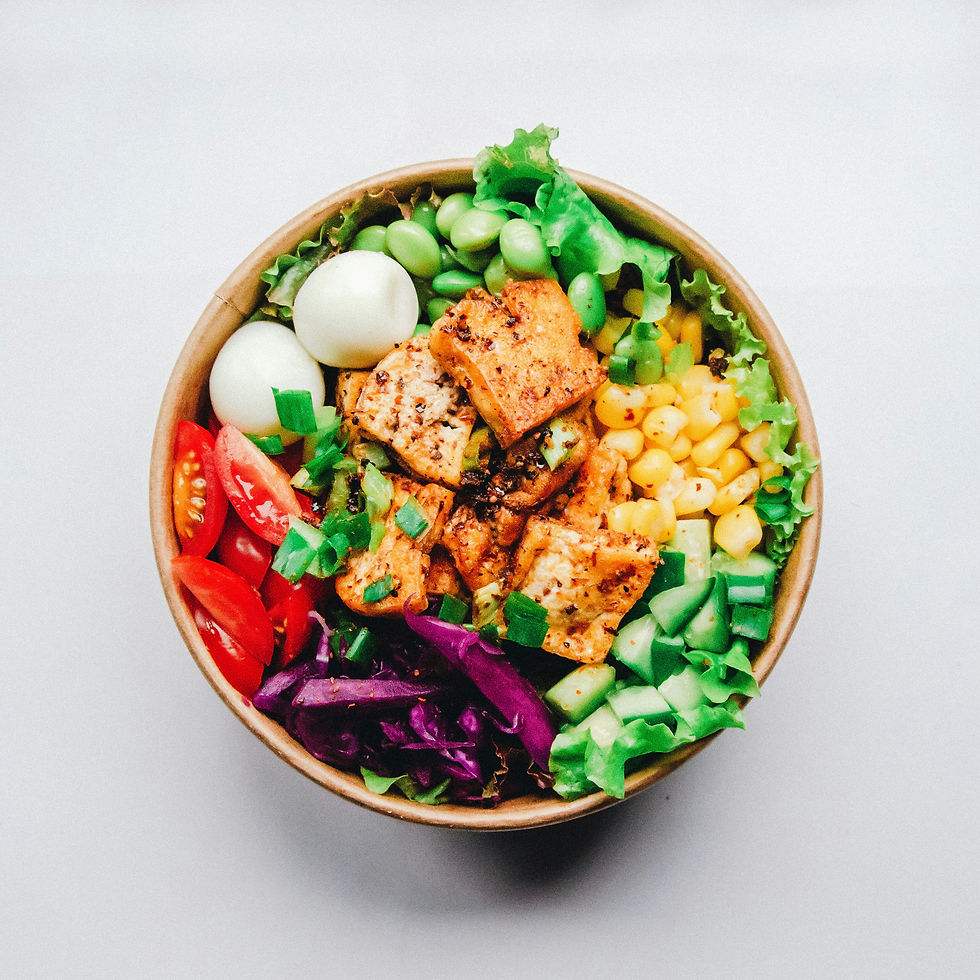Food for Hormones: What to Eat (and What to Watch) in Perimenopause
- Laura Kinkead
- Jun 28, 2025
- 4 min read
Wondering what to eat during perimenopause? Discover the best foods for hormone balance, stable moods, and better sleep, plus what to limit (without going full keto).

Why Food Matters (Yes, Even More Than Before)
In your 20s and 30s, you could get away with skipping meals, smashing wine and cheese, and calling a muffin breakfast. But now? One off-balance meal and you’re bloated, cranky, awake at 2am, or sobbing in your car because someone looked at you funny.
That’s not just aging. That’s perimenopause, and it’s time to understand how food either supports your hormones… or sets them on fire.
The Blood Sugar Rollercoaster: Hormones on a Loop
If you only take one thing away from this article, let it be this:
Blood sugar regulation is EVERYTHING during perimenopause.
Why? Because:
Fluctuating estrogen makes your body less insulin sensitive
Progesterone drops = mood instability
Blood sugar crashes → cortisol spikes → hot flashes, anxiety, and night waking
Unstable blood sugar = unstable energy, cravings, moods, and sleep
What you can do:
Eat within an hour of waking (yes, even if you're not hungry)
Include protein, healthy fat, and fibre at each meal
Avoid “naked carbs” (like toast, crackers, or fruit by itself)
Think: a boiled egg with your toast, chia seeds in your smoothie, or swapping cereal for Greek yoghurt + walnuts.
Protein is Queen (Especially at Breakfast)
You need more protein now than ever before, for:
Muscle maintenance (estrogen loss = muscle loss)
Blood sugar regulation
Neurotransmitter production (hello, serotonin)
Craving control
Mood stability
Aim for:
25–30g protein per meal (minimum)
100g+ per day depending on weight + activity
Protein at breakfast to set the tone for your day
Sources to love:
Eggs, Greek yoghurt, tofu, tempeh
Chicken, fish, legumes, protein powders (check ingredients)
Collagen peptides (support joints and skin too)
Healthy Fats = Hormone Support
Your body makes hormones using cholesterol and fat. So this is not the time to go fat-free.
Good fats help:
Stabilise blood sugar
Reduce inflammation
Support brain and mood
Keep you full longer
Best bets:
Avocados
Extra virgin olive oil
Fatty fish (salmon, sardines, mackerel)
Nuts, seeds (flax, chia, pumpkin, walnuts)
Avoid trans fats and seed oils in ultra-processed foods where possible - those are inflammatory junk, not nourishing fats.
Phytoestrogens: Nature’s Gentle Boost
Phytoestrogens are plant compounds that mimic estrogen in the body, at a much gentler level.
They can help smooth out the estrogen rollercoaster by binding to receptors and offering mild support.
Sources include:
Flaxseeds (ground, 1–2 Tbsp/day)
Organic soy (edamame, tempeh, miso, tofu)
Sesame seeds
Chickpeas and lentils
Don’t be afraid of soy, just choose whole, non-GMO forms and rotate through different types.
The Gut-Hormone Connection
Your gut isn’t just about digestion, it’s part of your hormone detox and elimination system.
A healthy gut = efficient estrogen clearance = fewer symptoms.
Gut-friendly foods:
Prebiotic fibres (onions, garlic, asparagus, bananas)
Fermented foods (kimchi, sauerkraut, kefir, plain yoghurt)
Fibre-rich fruits and veggies
Water—lots of it
If your gut is sluggish, bloated, or unpredictable, hormones will be too. Consider probiotics, stool testing, or support from a naturopath or gut specialist if needed.
What to Cut Back (Without Going Keto or Miserable)
You don’t need to overhaul your life, but some things can quietly sabotage your balance:
⚠️ Limit:
Alcohol – affects sleep, anxiety, and blood sugar (especially wine, sadly)
Refined sugar – worsens mood swings, cravings, and inflammation
Ultra-processed foods – packed with additives and hidden sugars
Caffeine (after midday) – especially if you’re anxious or not sleeping
Artificial sweeteners – disrupt gut health and insulin response
You don’t have to quit everything. Just get curious about how they actually make you feel—and reduce what doesn’t serve you.
Supplements That Might Help (Backed by Science)
Always check with your GP or health professional before starting new supplements, but some helpful ones include:
Magnesium (glycinate) – for mood, sleep, PMS, and muscle tension
Omega-3 (fish or algae oil) – anti-inflammatory and mood support
Vitamin D3 + K2 – supports bones, mood, and hormone health
B-complex – helps with energy and stress
Adaptogens – like ashwagandha or rhodiola for stress support
Collagen peptides – for skin, joints, and gut lining
Not everyone needs every supplement. Test, track, and go slow.
Final Word: No Shame, Just Strategy
You don’t need to eat perfectly. You don’t need to go paleo or become a green juice girl.
You just need to understand what your body is asking for, and give it real nourishment, consistently.
Perimenopause is not a time for restriction, it’s a time for support, stability, and self-compassion. So you've come to the right place!
Join the Knew You Society to learn more, share your experience, and find your strength in community.
Sources & Further Reading:
Jean Hailes for Women’s Health – www.jeanhailes.org.au
Newson Health Menopause Society – www.newsonhealth.co.uk
Cleveland Clinic – www.clevelandclinic.org
British Dietetic Association – www.bda.uk.com
Office on Women’s Health (US) – www.womenshealth.gov
North American Menopause Society (NAMS) – www.menopause.org

Comments